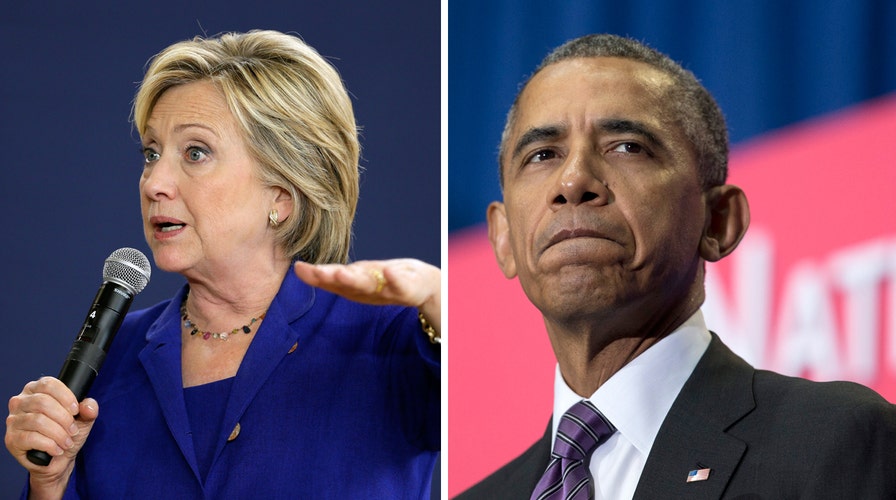Hillary Clinton, despite having served a full term in the Obama Cabinet, is making an overt effort to distance herself from the president’s agenda as she tries to distinguish herself as a candidate -- and blunt attacks from both ends of the political spectrum.
The 2016 Democratic front-runner executed her most significant break yet from President Obama on Wednesday when she came out against the Trans-Pacific Partnership. Obama has made the free-trade agreement a centerpiece of his second-term agenda, despite opposition from many on the left -- including labor unions and Clinton's top 2016 primary rival Sen. Bernie Sanders.
Clinton, after hedging for months, said in an interview with PBS on Wednesday there are too many "unanswered questions" about the deal, saying: "What I know about it as of today, I am not in favor."
She later said in a written statement that, "the bar here is very high and, based on what I have seen, I don't believe this agreement has met it." Her position on the agreement also marks a striking reversal for the former secretary of state, who promoted the deal in dozens of appearances during Obama's first term in office.
Even before Wednesday's statement, Clinton was drawing differences with Obama on several fronts, notably on Syria.
"I am not running for my husband's third term or President Obama's third term," Clinton told voters in Davenport, Iowa Tuesday, repeating a common theme from her campaign speeches. "I'm running for my first term."
Last week, Clinton called for a no-fly zone over Syria, in direct contrast with the administration’s current policy.
“I personally would be advocating now for a no-fly zone and humanitarian corridors to try to stop the carnage on the ground and from the air,” Clinton said in an interview last Thursday, just days after White House Press Secretary Josh Earnest had ruled out such a move.
"On the no-fly zone, our position on that hasn’t changed, which is at this point that's not something that we're considering,” Earnest said. “It raises a whole set of logistical questions about how exactly what would be enforced, what sort of resources would be used to actually protect that area.”
Earnest reiterated the administration’s opposition to a no-fly zone on Wednesday, stressing that enforcing the zone would require “significant resources.” He said if the U.S. devotes resources for that purpose, “you’re not using those resources to hit ISIL targets.”
It was the latest in a number of disagreements between the two on Syria. In September, Clinton called the effort in Syria a “failure.”
“Where we are today is that we have a failed program,” Clinton told CBS’ “Face the Nation" on Sept. 20, also calling for approximately 65,000 refugees to be allowed into the U.S.
The firmer stance on foreign policy crisis areas like Russia and Syria is reminiscent, albeit on a less aggressive level, of Clinton’s foreign policy criticisms of Obama during the tough primary campaign Clinton ran against then-Sen. Obama for the 2008 party nomination.
In 2007, when Obama said he would be prepared to meet without preconditions with leaders of rogue nations, including Iran, in the first year of his presidency, Clinton told the Quad City Times: "I thought that was irresponsible and frankly naïve."
Lingering disagreement is to be expected this time around, according to former Joe Biden speechwriter Matt Litman.
"They ran against each other eight years ago so they don't agree on every issue and on some of these issues it's good to see Hillary coming out with some of her own positions. There's no reason to be lock-step on all these issues," Litman said.
On domestic policy, Clinton has also set herself apart by pledging to go further than Obama on topics dear to the hearts of those in the Democrats’ progressive base. However, it remains to be seen if voters will buy her move away from the president, considering she played a key role in his Cabinet as secretary of state.
"She's trying to placate the left, that's where her largest competition is right now with Bernie Sanders. That's why he, as a progressive is really challenging Hillary Clinton, because a lot of liberals and progressives who gained power under President Obama don't think she is a bona fide liberal, or at least liberal enough," Tony Sayegh, a Republican strategist, told Fox News.
On both immigration and gun control, she has pledged to use her executive power if elected president to do more than Obama.
Citing Obama's deportation policy, Clinton said this week, "I'm not going to be breaking up families. And I think that is one of the differences." She added, "But I totally understand why the Obama administration felt as though they did what they did under the circumstances."
After the Oregon college shooting last week, Clinton said Monday she would be prepared to use executive actions if Congress refused to act on the issue, distancing herself both from Obama and also from Sanders -- who often has shied away from the subject of gun control.
Clinton also pledged last week to repeal a controversial, but vital, component of ObamaCare – the so-called Cadillac plan tax.
While praising the president for his “historic achievement” and pledging that her plan was a way of defending and building upon Obama’s signature domestic legislation, she nonetheless said she would scrap and replace that tax that targets high-cost employer-sponsored health care plans.
Some differences between the two are perhaps more a case of Clinton beating Obama to the punch, rather than a genuine difference in policy. Clinton recently announced her opposition to the Keystone XL pipeline, while the Obama administration has not yet made a formal decision on the project that supporters say would create thousands of jobs, but remains opposed by environmentalists.
However, both the Clinton campaign and the administration have been keen not to clash directly. Before Clinton announced her opposition to the Keystone pipeline and gun proposals, campaign staff alerted the White House, the Associated Press reported.
And a White House official said Clinton's staff gave them a "heads-up" before the trade remarks on Wednesday.
"She's been reluctant up until now [to criticize Obama] because the White House is who she needs to keep Joe Biden out of this race. That decision is coming soon, and so you're seeing her playing a lot more offense which is good for her I think," Sayegh said.
Fox News’ Tamara Gitt and The Associated Press contributed to this report.

























